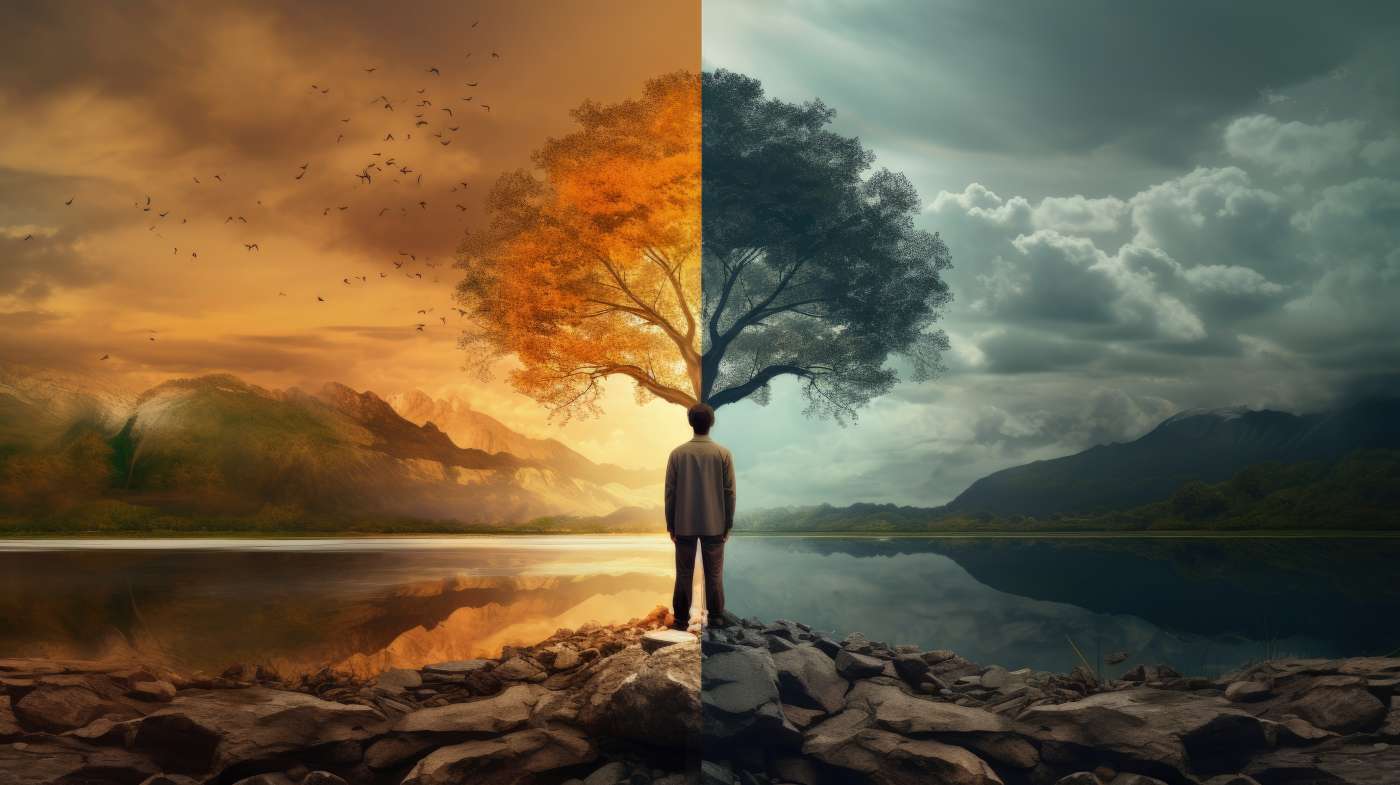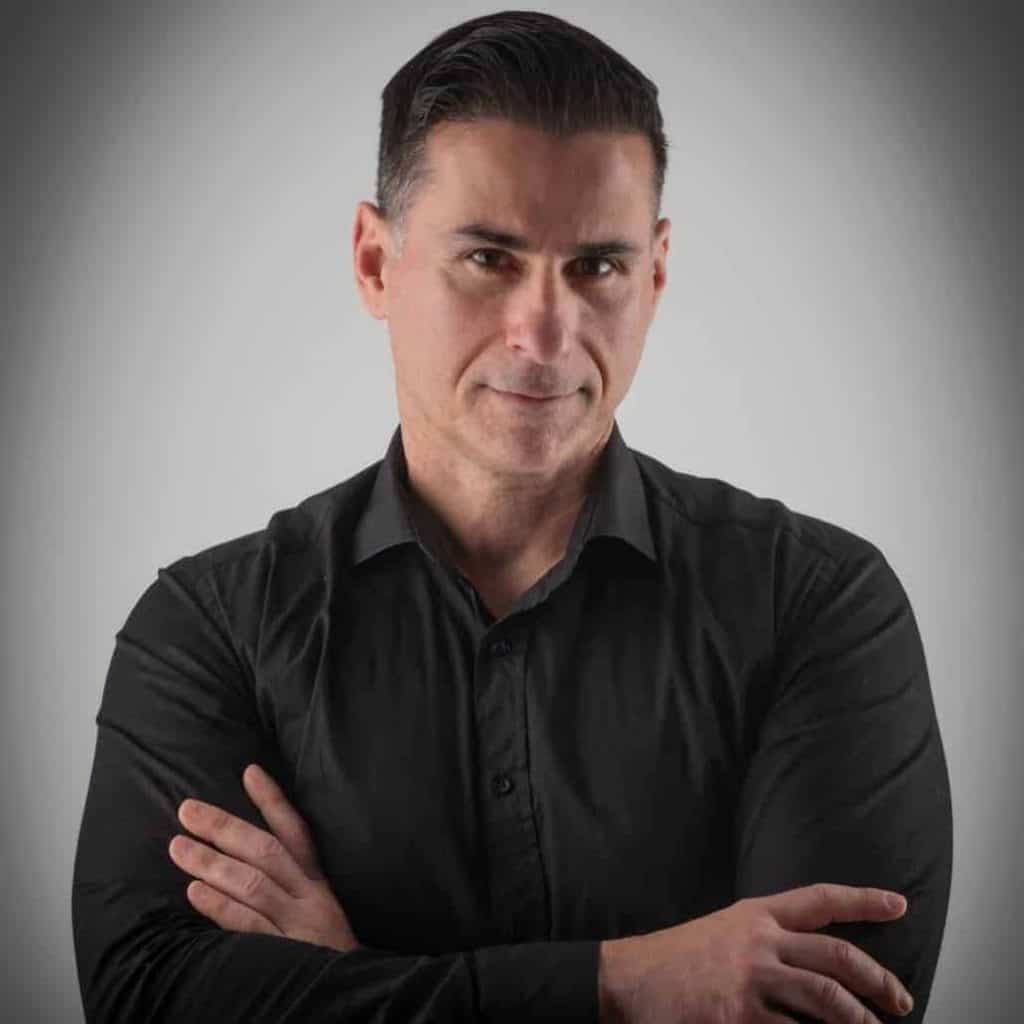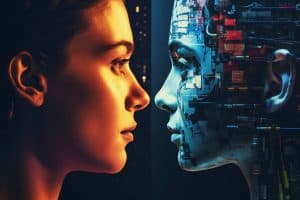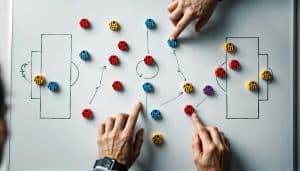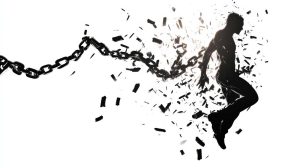In a quiet pre-dawn hour, a young artist sits before a blank canvas, tablet in hand. Overnight, an AI algorithm has painted an image in her style – a piece so deft that even she struggles to tell if it’s hers.
As the city around her hums with automated efficiency, she wonders: What does it mean to be human when machines can do so much of what once defined us? This question echoes from lonely apartments and bustling offices alike.
In the 2020s, artificial intelligence is no longer science fiction; it is rewriting the script of modern life, challenging not only how we work but fundamentally why we work.
The transformation is profound, disorienting, and potentially liberating if we allow it. Yet amid the promise of liberation lie deep human anxieties. We find ourselves at a crossroads of technology and philosophy, where ancient questions of purpose, identity, and the soul gain fresh urgency.
Our experiential workshops and services on overcoming fear inspired this extended approach to this subject. The role of AI in fear is growing; however, we think a different approach is needed to this cataclysmic change.
Table of Contents
ToggleAI and the Crisis of Human Purpose
Our jobs, roles, and daily tasks have served as anchors of identity for generations. “You are a teacher. An engineer. A nurse… Not just titles – but extensions of the self,” as one commentator notes.
Society taught us to cherish being “hard-working” as a core value. But what happens when intelligence becomes ambient, embedded in devices and systems that do what we once did, only better? This is no longer a hypothetical scenario – it’s unfolding across industries today.
The truck driver with quiet pride is asked to upskill into a job that may not exist yet; the loyal 30-year veteran of a company learns that her dedication is no longer relevant in the face of automation. This isn’t just economic disruption. It’s identity erosion, and it cuts deep.
Lots of different expressions of fear are involved.
We live in a culture that often equates busyness with worth. Being perpetually busy – wearing exhaustion like a badge of honor – has been our defense against confronting more profound questions of meaning.
Now AI is forcing that confrontation. As algorithms shoulder the “busywork” that once filled our days, many of us are left with an uncomfortable void of silence. In that silence lives a haunting question: “If I stop doing, will I stop being?”.
When a machine can do your job faster and cheaper, what do you do with your time? More importantly, what do you do with yourself? The quiet erosion of work-as-identity leaves many grappling with a loss of purpose – existential unemployment.
Ironically, even as AI relieves us of certain labors, it introduces new pressures. In many workplaces, technology doesn’t just replace labor – it redefines it.
Employees find their every movement tracked by AI-driven metrics; cameras monitor driving habits, wearable devices flag “idle” minutes, and software scores our productivity in real time.
The intention may be efficiency, but it often feels like dehumanization to the people under the algorithm’s gaze – “you’re no longer a person doing your best; you’re a variable in someone else’s performance model”.
We built machines to reduce drudgery, yet in some sense, people fear becoming machines themselves, valued only for what they output. The result is a subtle erosion not just of jobs, but of dignity and meaning.
It’s little wonder, then, that a quiet panic underlies the discourse of our AI-driven era. Recent analyses warn that AI can “alter how people view themselves”, degrading skills and experiences “essential to being human”.
As we hand over more decision-making and creative tasks to algorithms, we risk gradually erasing our judgment, serendipity, and critical thinking.
A philosopher writes that humanity will likely survive this technological onslaught, “but our way of existing will be impoverished” if we are not careful.
In short, AI’s actual existential threat may be philosophical rather than apocalyptic – a challenge to our sense of identity, value, and meaning.
Mental and Emotional Implications: The Hidden Cost of Rapid Change
The wave of AI-driven automation doesn’t merely threaten jobs—it profoundly impacts our emotional and mental health, shaking our inner world as much as our external one.
When one’s profession becomes obsolete overnight, the result isn’t merely economic disruption; it can trigger an emotional crisis, deeply rooted in identity loss, shame, and grief.
For many, losing a job isn’t just a loss of income—it’s a loss of dignity, social status, and self-worth. The psychological toll can be devastating, manifesting as increased anxiety, depression, and a pervasive sense of alienation from society.
Psychiatrist Viktor Frankl famously noted, “Unemployment neurosis emerges not from economic deprivation alone, but from the lack of purpose, direction, and structure.”
Frankl’s insight underscores a profound truth: humans crave purpose and structure, and when these anchors vanish abruptly, emotional distress quickly follows.
In an era when artificial intelligence rapidly displaces careers—from creative professionals to seasoned managers—this “unemployment neurosis” is emerging as a modern epidemic, largely unseen but profoundly felt.
Clinical psychologists report that displaced workers frequently struggle with self-esteem and identity crises, feeling as though a critical part of themselves has been amputated.
The narrative once affirmed by their careers—”I am a provider,” “I am skilled,” or “I matter”—suddenly becomes invalid, leaving behind emotional scars often hidden beneath societal expectations to “pivot” or “reinvent oneself.”
This pressure, though intended as encouragement, frequently compounds emotional suffering by subtly implying personal failure for those unable to adapt swiftly.
Beyond individual struggles, widespread job displacement risks exacerbating broader societal isolation. Renowned sociologist Émile Durkheim once argued that meaningful work is a critical binding force within communities, giving individuals a sense of belonging and collective purpose.
Without this shared sense of contribution, societies risk descending into what Durkheim termed “anomie”—a social void characterized by disconnection, loneliness, and moral confusion.
As AI continues to reshape economies at unprecedented speed, this anomie becomes an increasingly tangible threat, amplifying feelings of emotional isolation even in densely populated urban environments.
Yet, recognizing and openly addressing these emotional implications offers a path toward resilience.
Philosopher Alain de Botton reminds us, “The greatest privilege of work is not money but dignity, purpose, and connection.”
Understanding this truth can guide society in responding to AI-induced disruptions, not merely with economic measures but emotional support systems that help individuals process grief, rebuild self-esteem, and rediscover a sense of purpose outside traditional employment.
In practical terms, this could mean investing in robust mental health infrastructure, offering psychological counseling alongside retraining programs, and normalizing open discussions about the emotional realities of job loss.
Communities and workplaces can actively foster environments that validate these struggles rather than stigmatize them. Such empathy-infused approaches can help transform personal tragedies into opportunities for deeper self-awareness and growth.
Ultimately, while AI continues rewriting work rules, society must proactively acknowledge and address the invisible but deeply human impacts of rapid change. Doing so is not merely compassionate—it is essential if humanity is to thrive emotionally and psychologically in the transformative decades ahead.
However, there is a different approach to the whole AI thing. Here comes the best.
Fear of the Unknown in a Changing World
The unease many feel today is part of an old human story: the fear of the unknown.
Every revolutionary change – from the advent of electricity to the internet – has provoked anxiety about what lies ahead. But the AI revolution strikes a particularly sensitive nerve. It touches on our uniqueness: our intellect, creativity, and consciousness.
People worry: Will I become obsolete? Will I lose my purpose? What does the future hold for my children in a world run by algorithms? While amplified by new technology, these fears echo age-old anxieties about change and uncertainty.
Philosopher Jiddu Krishnamurti once observed a profound truth about fear: “One is never afraid of the unknown; one is afraid of the known coming to an end.”
In other words, we don’t truly fear the abstract future – we fear losing the comforts and identities we cling to in the present. The teacher fears a world where her hard-won skills are no longer needed; the artisan fears a market flooded with flawless machine-made designs, rendering his craft moot.
The end of the known – the familiar roles, routines, and assumptions – sends a chill down our spines. As Krishnamurti suggests, the real source of our anxiety is the shattering of certainties, the demand that we step into a new reality where old patterns no longer apply.
History has repeatedly forced humanity to face this fear. The Industrial Revolution, for example, uprooted agrarian lives and spurred the Luddites to smash mechanical looms in desperation.
Each time, we eventually adjusted – but not without turmoil in between. With AI’s rise, the speed and scope of change feel unprecedented. Our forebears could at least see the machines replacing muscle; today’s AI is an invisible, inscrutable force replacing mental labor and even creative arts.
The unknowns feel deeper: Can a machine be creative? Will AI surpass human intelligence completely? If so, what becomes of us, the creators of these tools? These questions have moved from science fiction into boardrooms and kitchen table conversations.
Psychologically, fear of AI often manifests in two ways.
One is practical fear – worry about job loss, economic displacement, or privacy invasions by intelligent systems.
The other is more existential fear – a vague but profound anxiety that humans may lose their significance or even their soul in a world of intelligent machines. A recent study found a high prevalence of such existential anxieties related to rapid AI advancements.
People speak of feeling “haunted” by the pace of change, of lying awake at night pondering a future that feels like a void. Even tech leaders voice deep concern: a 2023 statement signed by hundreds warned that mitigating the risk of AI causing the extinction of humanity should be a global priority.
While apocalyptic scenarios of rogue superintelligence grab headlines, many philosophers point to a quieter threat: not AI enslaving or destroying us, but AI incrementally hollowing out what it means to be human. As poet T.S. Eliot wrote, the world might end “not with a bang but a whimper” – a slow diminishment of human richness rather than a dramatic cataclysm.
Yet if fear is as old as humanity, so are wisdom and courage.
Our species has long turned to philosophy, spirituality, and art to navigate the terror of uncertainty. Facing the unknown drives us inward, prompting us to ask fundamental questions about who we are and what truly matters.
In this AI-augmented moment, as the “clock is ticking” on a turning point in human history, we have a chance (and perhaps an obligation) to draw on our deepest wells of insight. The following sections explore how ancient and modern philosophies – from Stoicism to existentialism to Eastern wisdom – can guide us, and how even esoteric spiritual traditions offer maps for personal transformation amid societal upheaval. The technologies that provoke our fear may also prompt us to grapple with age-old questions of purpose and soul, finally.
Ancient Wisdom for Modern Uncertainty
Existentialism: Freedom, Meaning, and the Courage to Choose
When the external structures of life are thrown into doubt, existentialist philosophers remind us that meaning is not something given to us – it is something we create.
In the mid-20th century, thinkers like Jean-Paul Sartre and Simone de Beauvoir grappled with a world that felt absurd and groundless after the traumas of world wars. Their answer was bracing: humans are “condemned to be free,” responsible for inventing purpose in an indifferent universe.
If AI erodes traditional roles and routines, an existentialist might argue that this shock forces us to confront our freedom anew, frightening but also an opportunity to create meaning more intentionally.
Simone de Beauvoir wrote that mere survival, a life spent only perpetuating itself, is “indistinguishable from absurd vegetation”—in other words, simply existing is not enough; we justify our lives by surpassing ourselves and striving toward self-chosen goals.
If our old work identities fall away, we must not lapse into passive “absurd vegetation.” We have the freedom (and necessity) to ask: What do I care about beyond a paycheck? What values or projects can I devote myself to that no machine can take away? The existential challenge is to will our own existence in its finiteness—to use our freedom to craft meaning rather than flee from responsibility.
Viktor Frankl, a psychotherapist and Holocaust survivor deeply influenced by existential thought, observed how crucial a sense of purpose was even in humanity’s darkest hours.
In the concentration camps, he saw that “Nietzsche’s words, ‘He who has a why to live for can bear with almost any how,’ could be the guiding motto” for survival.
That famous maxim – he who has a why can bear almost any how – underscores a human truth as relevant in the AI era as ever: a person with a clear purpose can endure upheaval and suffering with resilience.
If algorithms strip away the trivial “hows” of daily labor, we must focus on our “whys.”
Why do you get up in the morning, if not for the spreadsheet or the delivery route? Perhaps to care for your family, create beauty, seek wisdom, and help others. Those purposes remain, and may shine even brighter once the noise of busyness quiets down.
Existentialism does not sugarcoat the situation – it tells us that anxiety (Angst) is inevitable in being free and facing the unknown. But it also empowers us: we are not helpless cogs defined by our work tools but authors of our lives.
While terrifying, the loss of external definitions can spur an inner journey to define ourselves.
We must, in Sartre’s words, “invent the meaning of our life” anew each day. In the age of AI, this might mean detaching our sense of self-worth from economic productivity and rediscovering it in authentic choices and relationships. The question “What would you do with yourself?” when the machine does your work is a call to personal creation.
It is an invitation to practice what Camus called the ultimate rebellion: to say yes to life’s absurdity and still insist on carving out meaning, to imagine Sisyphus happy even as he pushes a new kind of boulder.
Stoicism: Inner Strength Amid Outer Turmoil
Long before AI and automation, the Stoic philosophers of ancient Greece and Rome taught strategies for thriving under conditions we cannot control.
Stoicism’s wisdom seems custom-made for an era of rapid change: focus on what is in your power (thoughts, actions, character) and accept with grace what is not (the external events and outcomes).
As the Roman emperor Marcus Aurelius, who himself led a life of constant uncertainty and war, wrote in his journal: “Observe constantly that all things take place by change, and accustom thyself to consider that the nature of the Universe loves nothing so much as to change…”.
The universe is changing; resisting it is as futile as trying to hold back the tide. Our power lies in how we adapt and respond.
Applying stoicism to the AI age, we might take comfort in the fact that while we can’t halt technological progress, we can control our response.
We can learn continuously, cultivate emotional intelligence and ethics skills that machines struggle with, and support one another in the community.
We can guard our minds against despair or envy and focus on maintaining our integrity and purpose regardless of external upheavals.
The Stoics also remind us to distinguish between what is truly good (virtue, wisdom, compassion) and merely preferred (status, wealth, even a particular job).
Losing a job to AI might be a blow to our comfort or ego, but in Stoic eyes, it is not a blow to our true self unless we let it corrupt our character.
As Epictetus taught, “It’s not things themselves that disturb us, but our judgments about them.”
We suffer more in imagination than in reality, Seneca echoed, urging us to confront fears rationally rather than let them grow into monsters in the mind.
One powerful Stoic practice is the premeditation of adversity—imagining change and loss before they happen, not to wallow in dread but to realize we can endure and will still be ourselves afterward.
A modern worker might imagine: What if AI transforms my profession in five years? How would I find stability?
This exercise can transform fear into preparation. It might reveal, for instance, that one’s core values–teaching others, creative expression, or analytical problem-solving can be fulfilled in multiple ways, not just in one job title or industry.
Technology may change the form of our service, but not necessarily the essence.
The Stoic attitude, then, counsels resilience: anticipate change, welcome it even, and respond with your best self. In the words of Marcus Aurelius, “The impediment to action advances action. What stands in the way becomes the way.”
If AI blocks the old path, Stoic wisdom encourages us to see this as an opportunity to forge a new one, perhaps one that leads to deeper excellence or virtue that we might have otherwise neglected.
Eastern Philosophy: Embracing Impermanence and Finding Flow
From the East, too, come time-tested philosophies for navigating uncertainty.
Buddhism teaches that suffering arises from clinging to what is impermanent, and in truth, everything is impermanent. Heraclitus said no one steps in the same river twice; the Buddha might add that the river is in constant flux, and so are we.
To find peace, we must accept change as a fundamental feature of existence.
An oft-cited insight in this vein (sometimes attributed to Lao Tzu) counsels: “If you realize that all things change, there is nothing you will try to hold on to.”
This is not a call to apathy but to non-attachment—to participating fully in life while gracefully letting go of each chapter as it passes.
In an AI-driven world, jobs may come and go, industries rise and fall; those who can adapt like water, taking the shape of new circumstances without breaking, will suffer less than those who rigidly resist the inevitable.
Taoism, articulated by Lao Tzu and other sages, emphasizes living in harmony with the Tao—the natural way of the universe. The Taoist approach to rapid change is to remain centered and observe the currents without panic.
Lao Tzu famously said, “To the mind that is still, the whole universe surrenders.”
In practical terms, this suggests that we can respond to external turmoil with clarity instead of a frantic reaction by cultivating inner stillness (through meditation, reflection, or just mindful living).
When everyone is rushing to keep up with the latest AI trends, a Taoist might advise stepping back and asking: Are we flowing with humanity’s real needs or just chasing novelty?
Paradoxically, sometimes yielding leads to better outcomes than constant resistance. In martial arts terms, if AI is a powerful force, perhaps we do better channeling its momentum constructively than opposing it head-on.
Eastern thought also places great value on self-knowledge.
The Upanishads of India and texts like the Tao Te Ching remind us that there is a deeper self or essence beyond our fleeting roles and thoughts. “Knowing others is intelligence; knowing yourself is true wisdom,” wrote Lao Tzu.
In an age obsessed with artificial intelligence, perhaps we are being nudged to rediscover the neglected realm of inner intelligence – soul, spirit, or self-awareness.
While we strive to build machines that can mimic human thinking, Eastern sages advise us to remember to explore the frontiers of consciousness within.
Practices like meditation, yoga, or tai chi are centuries-old “technologies of the self” that can help cultivate equanimity amid chaos. A person grounded in such practice might weather AI disruptions with a calm sense of “I am more than my job; I am the witness of change, not its victim.”
That kind of technology and deep inner exploration of our fears and existence can bring about profound realizations. It is a different kind of “technology” that humans have always cultivated.
The Bhagavad Gita advises acting in the world without being attached to the fruits of action – a teaching that, if applied, could immunize us against the whiplash of economic booms and busts.
Do your duty, the Gita says, but don’t pin your identity on the outcome. In an AI future, our “duties” may change form repeatedly, but the spirit of mindful action and compassionate contribution can remain constant.
Esoteric Insights: Alchemy, Sufism, and Inner Transformation
Beyond formal philosophies, the human heritage includes esoteric and spiritual traditions – streams of wisdom often hidden in symbolism and mysticism. Surprisingly, these ancient teachings have much to say about transformation and finding purpose in uncertain times.
Consider alchemy, the medieval art of turning base metals into gold. On the surface, it was a proto-science, but depth psychologists like Carl Jung revealed alchemy as a grand metaphor for inner transformation. The alchemists spoke of nigredo (blackening, dissolution), albedo (purification), and rubedo (reddening, enlightenment)—stages of turning lead into gold that mirror the stages of personal growth.
In times of chaos, one can see society in a nigredo phase – old forms dissolving into uncertainty.
But this very disintegration is the precursor to new integration. The “gold” we seek might be a new sense of self or collective wisdom from the trials.
Alchemically, the task is to endure the nigredo without despair, trusting that with effort and insight, a brighter state will follow. In facing our fears and uncertainties, each of us is like an alchemist working on the raw material of our own soul – refining fear into courage, confusion into insight, despair into renewal.
As one hermetic axiom states, “As above, so below”—the outer upheavals (macrocosm) reflect inner processes (microcosm), and by transmuting ourselves, we also help transmute the world around us.
Mystical traditions of various cultures echo this theme of transformation.
In Sufism, the mystical branch of Islam, there is the concept of fana – the dissolution of the ego in the love of the Divine – followed by baqa, a return to life with a remade self that lives in alignment with higher truth.
A Sufi might see the “death” of our old work-ego identities as a step toward finding a more enduring identity grounded in spirit. The 13th-century Persian poet Rumi, a beloved Sufi sage, captured this beautifully: “Yesterday I was clever, so I wanted to change the world. Today I am wise, so I am changing myself.”.
His words remind us that external change (even as drastic as an AI revolution) ultimately invites inner change.
Instead of trying futilely to control the tidal wave of technological progress, we can redirect our energy inward, refining our character and perception. When we change ourselves—becoming wiser, more compassionate, and more creative—we do change the world through each interaction and decision.
Sufi wisdom also emphasizes the power of love and the heart. “Move, but don’t move the way fear makes you move,” Rumi also advised, urging actions guided by love or curiosity rather than panic.
Cultivating love, empathy, and human connection might be the most radical and necessary act in a time when fear of the unknown runs high.
We might recall how spiritual movements and social reform sprang up during the Industrial Revolution in response to the dehumanization of factory life – from the Transcendentalists in America seeking reconnection with nature and soul, to religious revivalists working to soften the era’s harsh edges.
Likewise, the AI era may catalyze a spiritual renaissance, a search for meaning beyond the material productivity that machines excel at.
In fact, as routine mental tasks are automated, what remains—and gains new importance—are the quintessentially human domains: empathy, spirituality, artistry born of lived experience, and the pursuit of wisdom. These are the “gold” that cannot be manufactured; they are only cultivated within.
Even the much-misunderstood tradition of Hermeticism offers guidance, with its principle that the human being is a microcosm of the macrocosm. “As within, so without” goes the whole saying – the idea that by understanding and improving our inner world, we affect the outer world.
If the outer world now includes AI colleagues and digital ecosystems, the Hermetic view would be to ensure our inner compass (our values and intentions) guides how these tools are developed and used.
Rather than feeling powerless, this perspective empowers individuals to act as conscious co-creators with technology, imbuing it with our humane values.
Theosophists and mystics like Teilhard de Chardin saw human evolution toward spiritual convergence.
Teilhard envisioned a coming stage of humanity called the Noosphere – essentially a globe-spanning web of consciousness enveloping the Earth.
He wrote with uncanny prescience that “the noosphere is here” and that the digital interconnection of minds could transform “our very minds and souls” on a planetary scale. But he also knew this would highlight the limits of knowledge alone and require a leap in global consciousness to handle our new powers.
In Teilhard’s eyes, we are spiritual beings on a human journey, not the other way around. “You are not a human being in search of a spiritual experience. You are a spiritual being immersed in a human experience,” he wrote.
This poetic reversal is a salutary reminder in the tech age: however dazzling our machines, we must not forget the primacy of the spirit and inner life.
We are more than biological computers; there is a spark within each person that no algorithm can replicate or extinguish.
The Soul in the Age of Intelligent Machines
All these philosophical, spiritual, ancient, and modern perspectives converge on a simple truth: the locus of our purpose and identity ultimately lies within us, not in any external role or tool.
This is the idea of the soul or inner essence by our chosen name.
In an era of AI, talking about the soul can seem quaint or unscientific. Yet it may be more relevant than ever. As we create machines that mimic human thinking, we are prompted to ask: What is the difference between a clever machine and a human being?
The answer often circles back to qualities of the soul: consciousness, subjective experience, the capacity for love, ethical intuition, and the quest for meaning.
Machines can calculate and even create in simulated ways, but they do not yearn, suffer, or hope like human souls.
This distinction is not to denigrate AI, which is a magnificent product of human ingenuity in many ways, but to highlight what we must cherish and cultivate in ourselves.
A growing chorus of thinkers worries that we risk a self-fulfilling prophecy of soullessness in treating humans like machines (tracking our every move, optimizing us for output). AI has no soul, some technologists admit bluntly; it “can mimic humans, but… has no human-based instinct, no hormones driving it passionately toward love or hate”.
One observer quipped that AI’s emptiness “made me believe in the human soul by showing me what art looks like without it.”
In other words, the subtle spark that is missing in even the most impressive AI outputs points back to something profoundly alive in us.
Call it soul, consciousness, or the human spirit—it is that which makes a poem written from a lifetime of longing move us more deeply than a pastiche generated in seconds.
The role of the soul in an AI-driven age is to serve as our north star.
The inner compass can guide how we use these powerful tools, and it’s the core of value that we must never trade away for convenience or efficiency.
If we neglect the soul – if education and society focus only on technical skills and material success – we may awaken to a world of shiny gadgets and profound emptiness. Carl Jung noticed this nearly a century ago, observing that many modern people “suffer from a senselessness and emptiness of their lives” that no material improvement can cure.
He famously said, “People will do anything, no matter how absurd, in order to avoid facing their own souls.”
We distract ourselves with noise and novelty to sidestep that inner confrontation. But perhaps the silver lining of AI taking over many distractions and routines is that it leaves us with no choice but to face our souls.
The “quiet despair” of a post-work world can either turn into widespread depression, or – if we approach it consciously – into a societal turning inward, a search for what truly fulfills us beyond the next deadline or dopamine hit.
In practical terms, caring for the soul in an AI era means placing renewed emphasis on human connection, creativity, and compassion.
It means valuing the arts and humanities alongside STEM, since the arts often speak the language of the soul.
It could mean redesigning education to foster emotional intelligence, ethical reasoning, and self-understanding—skills no algorithm can provide.
It means making time for reflection (the very thing our “gospel of busyness” discouraged).
This could manifest as mindfulness programs in workplaces, community dialogues about values and technology, or individuals regularly unplugging and engaging in nature or spiritual practice to remember who they are.
We each may need to develop a personal answer to: How will I retain my humanity-my soul–amid intelligent machines? The answers will be diverse, but the act of asking the question is itself vital. It signals that we refuse to fall into a numb, mechanical existence; we insist on depth, feeling, and essence.
There are hopeful signs. Across the world, a movement for “human-centered AI” is gathering steam, aiming to ensure human ethics and benefits guide AI development.
Leaders talk about what AI can do and what it should do. Implicit in this is a recognition that values come from the human spirit. Some technologists even invoke Teilhard de Chardin’s vision of harnessing love: “The day will come when… we shall harness the energies of love for God. And, on that day, for the second time in the history of the world, man will have discovered fire.”
Teilhard’s poetic metaphor suggests that after mastering physical forces, humanity’s next great step is to master the force of love—arguably the energy of the soul—and put it at the center of our collective evolution.
In AI, harnessing the energies of love could mean designing systems that enhance our empathy rather than our impatience, amplifying the best in us rather than the worst. It means infusing our innovations with compassion.
Are we heading to a New Human Renaissance?
Standing at this crossroads of the 2020s–2030s, it becomes clear that the challenge of AI is not merely technical or economic – it is profoundly philosophical and spiritual.
We are, as one writer put it, “at a human turning point. The machines are ready… But maybe – maybe – we don’t have to keep racing [them].”
In other words, we can choose a different narrative than one of competition or replacement. We can choose a narrative of co-evolution: humans and AI evolving together, with humans providing the vision, purpose, and ethical framework machines lack.
The question is not whether machines can replace us; it is “whether we’re brave enough to replace the old story about what makes a life valuable.”
Now is the time to examine that old story – the one that equated our worth with our work, our productivity, our busyness – and to imagine a new story where value is rooted in presence, creativity, connection, and love.
As Arif Sheikh mused, perhaps the final invention is not a more intelligent machine but ourselves – a reinvention of what it means to be human.
In taking over so many tasks, AI is, in effect, holding up a mirror for us. In the reflection, we see how we have defined ourselves by doing rather than being. We also see the timeless core that technology cannot touch: our capacity for artistry, empathy, play, moral courage, wonder, and self-awareness.
These qualities might become the foundation of a new renaissance. Freed (to some degree) from survival-driven labor, humanity could pivot to purpose-driven living—spending more time mentoring, exploring nature, crafting art, and caring for one another—pursuits that ancient philosophers might say are the real point of life.
What sounded utopian can be surprisingly practical when you remember, as Sheikh points out, that “these were once the things we did before ‘jobs’ even existed”. The future might reconnect us with our ancient past, when humans lived by creativity, community, and contemplation by necessity, not as a luxury.
Of course, such a transition is not automatic. It requires intentional societal choices, such as rethinking education, economic structures (how might we support people in a post-work scenario?), and cultural values.
It will also not be smooth; there will be “quiet despair” to work through and inequalities to address. But the vision of a more soulful human presence in the world is worth striving for.
It’s a future where technology serves as a partner rather than an overlord, augmenting our abilities while we retain authorship of our destiny. Doctors might use AI diagnostics in the future, but their true healing gift lies in the human connection with their patients.
An architect might let AI software generate blueprints, but the soul of the design—the inspiration and aesthetic choice—flows from human imagination.
A teacher might have AI tutors to help with the basics, freeing him to ignite a love of learning in students—something no machine can do with human warmth.
The search for purpose in the age of AI may lead us to surprising places. We might revive philosophies and spiritual practices with fresh appreciation, finding in them not antiquated ideas but essential tools for resilience and meaning.
We might forge unlikely alliances – technologists with monks, scientists with poets – all recognizing that navigating the unknown requires rational insight and spiritual wisdom.
In confronting our fear of the unknown, we are like the mythic hero on a journey, who must leave the familiar world, face dragons (some are within us), and return with a boon to heal the community.
Our modern dragons are automation, uncertainty, and the potential loss of self. The boon we seek could be a new understanding of what it means to be human.
Let us return to that young artist facing the AI-painted canvas. Perhaps, after her initial doubts, she picks up her brush (or stylus) and begins to paint alongside the AI, adding the subtle strokes of emotion and intuition that only she can give.
In the process, she realizes that her role was never to produce an image; it was to infuse it with soul and communicate a perspective born of a human life.
Likewise, for us all, our role in the future is not merely to outperform machines (an arena where they will often win) but to outdo them—to bring depth of consciousness, ethics, and feeling into the world. That is our comparative advantage, our niche in the cosmic ecosystem.
In embracing that role, we may find our fears transmute into excitement. The unknown future remains vast but is also a canvas of possibility. With philosophy as our guide and purpose as our compass, we step into the new era not as anxious strangers but as protagonists of a grand adventure.
As Teilhard de Chardin envisioned, after harnessing the powers of the earth, we may yet harness the powers of love – and in doing so, discover fire for the second time. The fires of industry lit our cities; the fire of the human spirit will illuminate our path through the age of AI.
Ultimately, the relevance of philosophy and the search for purpose in this AI era lies in reminding us of who we are. We are the meaning-seekers, the change-adapters who can turn suffering into wisdom and uncertainty into transformation.
We are, irreducibly, the bearers of the soul in the machine age. If we can remember that, no matter how intelligent our technologies become, we will use them wisely and continue to grow into the fullness of our humanity.
The unknown future, rather than something to fear, becomes an open horizon – inviting us to evolve, create, and become more human, not less, in the company of our new intelligent tools. And that, in the final calculus, may be the true purpose of this transformative era: not to diminish us, but to prompt the next significant step in our personal and collective evolution – a step toward a more conscious, compassionate, and profoundly alive humanity.
Sources:
- Sheikh, Arif. The Work That Remains: AI, Identity, and the Future of Human Purpose. LinkedIn Article (May 4, 2025). (Explores how AI is unraveling work-based identity and calls for reimagining purpose beyond productivity.)
- Eisikovits, Nir. AI Is an Existential Threat—Just Not the Way You Think. Scientific American (July 12, 2023). (Argues that AI’s real threat is the philosophical erosion of human capacities and meaning, rather than human extinction.)
- Jiddu Krishnamurti (Berkeley Public Talk, 5 Feb 1969). (“One is never afraid of the unknown; one is afraid of the known coming to an end.” – On fear of change.)
- De Beauvoir, Simone. The Ethics of Ambiguity (1947). (On life’s value lying in surpassing itself – avoiding a stagnant existence “indistinguishable from an absurd vegetation.”)
- Frankl, Viktor. Man’s Search for Meaning (quoting Nietzsche). (“He who has a why to live for can bear with almost any how.” – Importance of purpose for endurance.)
- Lao Tzu (attributed). Tao Te Ching, various translations. (“If you realize that all things change, there is nothing you will try to hold on to.” – Wisdom of accepting impermanence.)
- Aurelius, Marcus. Meditations, Book IV. (“Observe constantly that all things take place by change… the Universe loves nothing so much as to change…” – Stoic counsel on the nature of change.)
- Rumi, Jalal al-Din. Quoted in OneJourney (Guy Finley). (“Yesterday I was clever, so I wanted to change the world. Today I am wise, so I am changing myself.” – Sufi insight on inner transformation.)
- Teilhard de Chardin, Pierre. Quoted in Evolution of the Mind: Noosphere to Omega Point and Luminary Quotes. (Perspective of humans as spiritual beings having a human experience; vision of harnessing the “energies of love” as the next stage of evolution.)
- Halal, William. The Noosphere Is Here. Kosmos Journal (Vol. 21 Issue 4). (Discusses Teilhard’s concept of the noosphere – a globe-spanning web of consciousness – in the context of the digital revolution and global challenges.)

